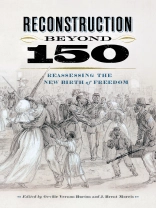No period of United States history is more important and still less understood than Reconstruction. Now, at the sesquicentennial of the Reconstruction era, Vernon Burton and Brent Morris bring together the best new scholarship on the critical years after the Civil War and before the onset of Jim Crow, synthesizing social, political, economic, and cultural approaches to understanding this crucial period.
Reconstruction was the most progressive period in United States history. Although marred by frequent violence and tragedy, it was a revolutionary era that offered hope, opportunity, and against all odds, a new birth of freedom for all Americans. Even though many of the gains of Reconstruction were rolled back and replaced with a repressive social and legal regime for African Americans, the radical spark was never fully extinguished. Its spirit fanned back into flame with the Civil Rights Movement of the 1950s and 1960s, and its ramifications remain palpable to this day.
Tabela de Conteúdo
1. ‘They Loved but Did Not Agree’: African American Women Divorcees in Post-Civil War Virginia (Arlisha Norwood)
2. Reconstructing Nationalism: Charles Sumner, Human Rights, and American Exceptionalism (Mark Elliott)
3. Oliver P. Morton and the Politics of Reconstruction (A. James Fuller)
4. Building a New Political Order: Reconstruction, Capitalism, and the Contest Over the American State (Nicolas Barreyre)
5. Race, Representation, and Reconstruction: The Origins and Persistence of Black Electoral Power, 1865–1900 (Peter Wallenstein)
6. Lynching in the American Imagination: A Historiographical Reexamination (Mari N. Crabtree)
7. ‘Magnificent Resources’: Reconstruction in Indian Territory (Troy D. Smith)
8. A New Birth of Freedom Abroad (Don H. Doyle)
9. Confederate Reconstructions: Generations of Conflict (David Moltke-Hansen)
10. Reconstruction at the Centennial Exhibition of 1876 (Krista Kinslow)
11. Mark Twain and the Failure of Radical Reconstruction (J. Mills Thornton)
12. Teaching Du Bois’ Black Reconstruction (Garry Bertholf and Marina Bilbija)
13. Three Historians and a Theologian: Howard Thurman and the Writing of African American History (Peter Eisenstadt)
14. Killing Calvin Crozier: Honor, Myth, and Military Occupation after Appomattox (Lawrence T. Mc Donnell)
Sobre o autor
Orville Vernon Burton is the Judge Matthew J. Perry Distinguished Chair of History at Clemson University and the author of The Age of Lincoln. J. Brent Morris is Professor of History at Clemson University and the author of Dismal Freedom: A History of the Maroons of the Great Dismal Swamp.












